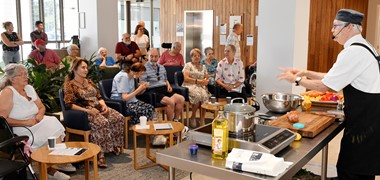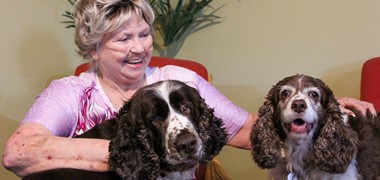Making the transition from hospital to home is easier with Brightwater

Coming home after an extended stay in hospital can be daunting, especially when you still need help with everyday things like showering and getting dressed.
Rockingham’s Mary Lewis found herself in that vulnerable position when she was discharged from hospital after four months.
In a series of traumatic events, Mary had broken her arm in a fall then contracted double pneumonia followed by Covid-19. She spent 28 days in ICU and was left with permanent scarring on her lungs, which means she now relies on daily oxygen therapy.
“It was very scary coming home because I couldn’t do very much for myself and I was worried about having another fall,” she remembers “But the Brightwater coordinator came to my home within hours of my discharge and she set up the pendant alarm to make me feel safe.”
Before leaving hospital, Mary had registered for Brightwater At Home’s Transition Care Program which provides therapy and support services in the home setting. Brightwater At Home Service Leader, Meredith Polglaze says an important part of the program is to help people feel they’re not alone.
“When you're in hospital, you've got people constantly looking after you and doing things for you. When you come home, there can be fear around how you are going to do it by yourself. The presence of our staff is very reassuring,” she says.
Setting goals for a better recovery.
The Transition Care Program (TCP) is subsidised by the state and federal governments with the aim of giving older people short-term support to continue their recovery after they leave hospital.
Some people undertake the transition program in temporary accommodation but many others, like Mary Lewis, are able to go back home where they get the services and therapies they need to regain as much independence as possible.
Meredith Polglaze says Brightwater At Home’s transition care team uses a goal setting approach to set up the appropriate services for each person’s individual situation.
“We ask our clients what they'd like to achieve and then we work to help them get there,” she says. “For example, if they have been in hospital after a fall, they may be on a walking frame right now, but their goal is to get a walking stick and walk to the shops 200 metres down the road. So we work with them to make them stronger, get fitter, improve their balance, improve their confidence, so they can get to the point where they return to walking down to the shops and completing their shopping by themselves.”
Mary’s goal was the team’s goal.
Mary had no doubt what her goal was for the 12 weeks of transitional care: she wanted to be able to walk her ten year old English Springer Spaniel, Chillay. When she first got home, it seemed an impossible task. She had been severely weakened by her time in hospital, and was now reliant on permanent oxygen with limited use of her left arm.
But Mary was determined and so was her Brightwater At Home team of physiotherapists, occupational therapists, dieticians and support workers.
“We worked on different techniques and goals to get back up to strength. We were working really hard to get the conditioning and the stamina and endurance back,” she says.
Success came with small milestones, like putting on a load of laundry or fixing a bowl of cereal with one hand. And finally, she was able to take Chillay for that walk.
“It was just up and down the driveway but I did it!” she says proudly.

Getting support for your transition.
The Transition Care Program provides individualised therapy and support services for up to 12 weeks to help older people improve their physical and mental wellbeing after a hospital stay.
It is available to eligible people aged 65 years and over, or 50 years and over for Aboriginal and Torres Strait Islanders.
To determine if you are eligible, you will meet with the Aged Care Assessment Team before you leave hospital so they can find out what level of support you will need.
If you qualify for the program, one of our Brightwater At Home coordinators will come to the hospital to meet with you, as well as your family or carers and the hospital team, to discuss your goals and how we can help you achieve them.
The support you will receive through the Transition Care Program starts as soon as you leave the hospital. Your Brightwater At Home coordinator will oversee all the assistance you need in order to keep improving. This may include:
- Clinical and nursing care.
- Physiotherapy, occupational therapy and speech therapy.
- Dietary and podiatry services.
- Help with personal care such as showering and dressing.
- Assistance with cleaning, shopping, meal preparation.
- Home Chef meals.
- Transport to medical appointments.
- A personal alarm, if required.
“Our clients love what we're able to do in assisting them to achieve their goals and get back to what they want to do. We often get comments saying how well the team has worked together and how much they appreciate that our coordinators are really receptive and supportive,” says Meredith Polglaze.
It’s about being supported from start to finish.
When clients complete the Transition Care Program, the Brightwater At Home Team is also on hand to help them move onto the next step.
“If they have received a lot of service from us, they may have some anxiety about life without transition care. So our coordinators work really hard to ensure that what comes next is all organised and that we have a smooth transition as much as we are able to,” says Meredith.
Mary Lewis has finished the Transition Care Program, and is now receiving home care services through Brightwater At Home. She says the success of her recovery is due to the support she got from her partner, who she calls ‘Mr Wonderful’, and Brightwater’s transition care team.
“They did an amazing job in helping me go from needing intense levels of support to being able to do things for myself. This program is brilliant. It can get you back to living the best life you can.”
Next steps.
For more information about Brightwater At Home’s Transition Care Program, call 1300 223 968.
Next steps.
For more information about Brightwater At Home’s Transition Care Program, call 1300 223 968 or email [email protected].


